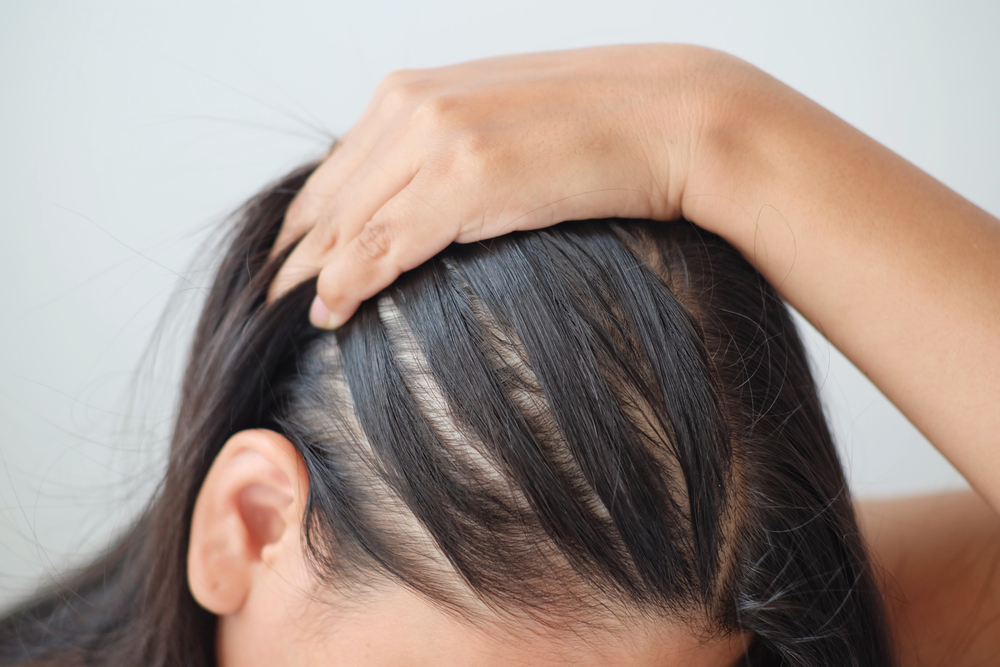
Female hair loss in Quincy, MA, is more common than many women think, and it can have a significant impact on self-confidence and emotional well-being.
While some hair shedding is normal, excessive thinning or bald patches should be evaluated by a medical professional.
With proper diagnosis and modern treatments, many women experience substantial improvement in thickness and overall hair health, making female hair loss a thing of the past.
Common Causes of Female Hair Loss in Quincy
Let’s take a closer look at the common causes of female hair loss in Quincy, MA and how a dermatologist can help treat it.
One of the most frequent causes is female pattern hair loss, related to genetics and hormonal changes.
Other triggers can include stress, thyroid imbalances, nutritional deficiencies, and some medications.
Autoimmune disorders such as alopecia areata can also cause patchy hair loss.
Pregnancy, menopause, or sudden illness can result in temporary shedding.
Determining the underlying cause is an important first step in finding the most effective treatment.
Early Action, Early Prevention
Early action for female hair loss in Quincy, MA, can be more successful when it begins with an early evaluation.
Hair follicles in a resting phase may not respond as well to treatment as those in active growth.
Initiating treatment early can slow or stop progression and increase the chances of regrowth.
Even if regrowth is limited, early treatment can help preserve existing hair.
Dermatologist Diagnostic Steps
A visual examination of the scalp often provides insight into potential causes.
Blood tests may check hormone levels, iron stores, or thyroid function.
In some cases, a small scalp biopsy may be performed to examine the hair follicles.
A review of medical history and lifestyle factors can also help uncover contributing factors.
With a comprehensive approach, dermatologists can develop a tailored treatment plan.
Non-Surgical Treatment Options
One of the most advanced and effective treatments for female hair loss is platelet-rich plasma (PRP) therapy.
The process involves taking a small amount of blood, concentrating the platelets, and injecting them into the scalp.
Topical medications such as minoxidil can also stimulate new growth when used consistently.
Laser light therapy uses low-level lasers to increase circulation and stimulate follicle activity.
Dermatologists often combine these methods to achieve the best results.
Treatments for Inflammatory Conditions
Inflammatory causes of female hair loss in Quincy, MA can be treated by addressing underlying inflammation.
Autoimmune-related hair loss may benefit from corticosteroid injections to reduce inflammation.
Medicated shampoos or topical treatments may control scalp irritation.
By reducing inflammation, the scalp becomes healthier and more supportive of growth.
Supporting Results with At-Home Care
Daily habits can help support results after treatment.
Gentle hair care, avoiding excessive heat styling, and using nourishing shampoos protect fragile hair.
A balanced diet with adequate protein, vitamins, and minerals promotes healthy growth.
Supplements may address nutritional deficiencies.
Stress management techniques such as relaxation exercises or meditation can benefit scalp health.
Realistic Expectations and Follow-Up Care
Hair growth is slow, and results may take several months to appear.
PRP treatments are spaced out and followed by maintenance sessions every six to twelve months.
Regular follow-ups monitor progress and allow for adjustments to the plan.
With time and consistent care, many women achieve thicker, healthier hair and greater confidence.
Say Goodbye to Female Hair Loss Near Quincy, MA, at Vibrant Dermatology
Don’t wait to make hair loss a thing of the past.
Call today to book your appointment with one of our specialists.
Contact us now at 617-250-0257 to speak with our team or book your dermatology appointment online.


